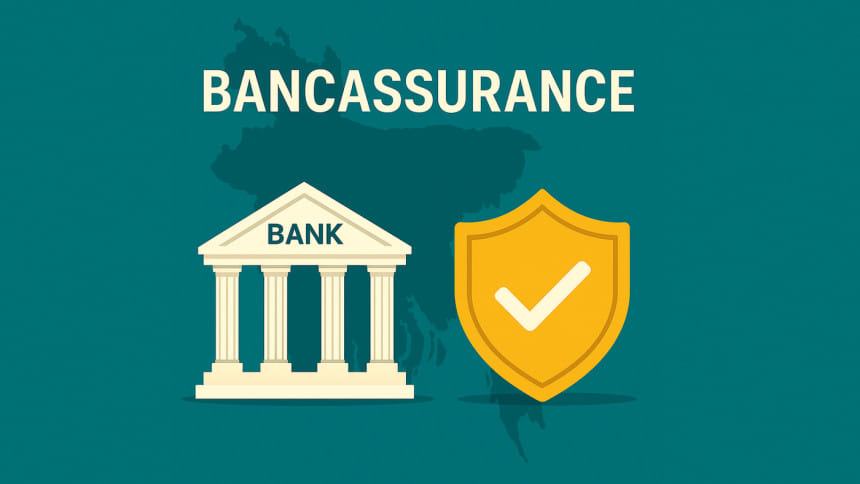Bancassurance’s promise for Bangladesh

In a significant move to deepen financial inclusion and revitalise the insurance sector, Bangladesh has embraced the bancassurance model, allowing banks to sell insurance products directly to their customers and enabling insurance companies to reach a wider market without developing their own extensive distribution networks.
Global Perspective on Bancassurance
Bancassurance is a concept that originated in France in the 1980s. The term itself is a combination of the French words banque (bank) and assurance (insurance). It has gained substantial popularity globally. In countries like France, Spain, and Italy, bancassurance accounts for over 60% of life insurance premiums. In Asia, nations such as India, China, and Malaysia have successfully adopted this model, leveraging the extensive reach of banks to distribute insurance products and thereby increasing insurance penetration among the population.
Bangladesh's Entrance into Bancassurance
Recognising the potential of bancassurance, Bangladesh Bank issued a directive on 12 December 2023, permitting all 61 scheduled banks—subject to eligibility—to operate as corporate agents for insurance companies. This initiative aims to enhance the accessibility of insurance products, especially life insurance, to a broader segment of the population. Under the guidelines, each bank may partner with up to three life and three non-life insurance companies, subject to approval from the Insurance Development and Regulatory Authority (IDRA) and Bangladesh Bank, and based on the following criteria:
1. Capital to Risk-Weighted Asset Ratio (CRAR) minimum 12.5%
2. Bangladesh Bank credit rating maximum grade 2
3. CAMELS rating maximum 2
4. Maximum Net Non-Performing Loan (NNPL) 5%
5. Positive profit in the last three consecutive years
Through this process, Bangladesh Bank ensures that only strong and financially sound banks are granted licences to operate in the bancassurance business—ensuring greater safety and security for customers and long-term sustainability for the model. Not all banks will receive licences unless they meet the regulatory criteria. As of now, only 12 out of the 61 scheduled banks have met the requirements and received approval to commence bancassurance operations. These pioneering institutions include City Bank, Eastern Bank, Standard Chartered Bank, BRAC Bank, Dutch-Bangla Bank, Midland Bank, Mutual Trust Bank, Prime Bank, Jamuna Bank, Pubali Bank, United Commercial Bank, and Premier Bank.
Many of these banks have already begun offering insurance products through their branch networks, telesales, and digital platforms. According to IDRA, 8,413 insurance policies were sold through banking channels as of December 2024. Life insurance policies have proven to be more popular than non-life products within the bancassurance model.

Training and Capacity Building
To ensure the effective implementation of bancassurance, the Bangladesh Insurance Academy (BIA) has played a key role in training bank personnel. Since the initiative's launch, BIA has conducted 86 training courses with participation from over 5,000 bankers. These trained professionals are now equipped to offer insurance products to customers while maintaining compliance with regulatory standards and building consumer trust.
Challenges and Opportunities
Despite a promising start, the insurance sector in Bangladesh continues to face challenges, including persistently low insurance penetration, which declined to 0.41% in 2024 from 0.50% in 2016. This figure remains significantly lower than that of neighbouring countries such as India, where insurance penetration stands at approximately 4%.
However, the extensive network of over 11,000 bank branches across the country—including more than 5,000 in rural areas—presents a unique opportunity to reach underserved populations. Bancassurance allows customers to easily purchase insurance products while conducting regular banking activities, thereby improving financial protection, promoting savings, and enhancing risk management for individuals and families. It is expected that maturity claims will be settled on the due date, with other claims processed in the shortest possible time.
Future Prospects
The integration of bancassurance into Bangladesh's financial sector holds immense promise for increasing insurance penetration, enhancing financial literacy, and providing risk coverage to a broader segment of the population. It also offers a new revenue stream for banks. As banks leverage their customer relationships and distribution networks to offer insurance products, collaboration between banks and insurers is expected to create a more resilient and inclusive financial ecosystem in the country.
In this context, adopting smart financial habits—such as the 50:30:20 rule—can further strengthen personal financial stability. This rule suggests allocating 20% of one's monthly income to savings and investments: 10% through bank schemes like deposit pension schemes (DPS) or term deposits, and the remaining 10% in insurance policies via bancassurance or other channels. Such habits not only promote financial discipline but also contribute to building a secure and stable financial future.
In a country like Bangladesh, where many face economic uncertainties and climate-related challenges, insurance provides not only financial protection but also vital peace of mind.
Md. Rashed Akter is the Head of the Retail Distribution Division and Chief Bancassurance Officer (CBO) at Midland Bank.

 For all latest news, follow The Daily Star's Google News channel.
For all latest news, follow The Daily Star's Google News channel. 



Comments